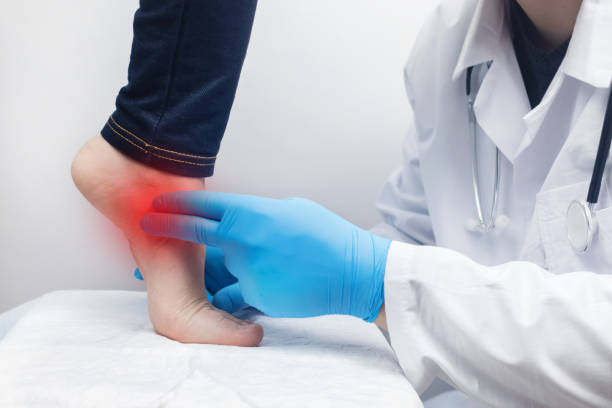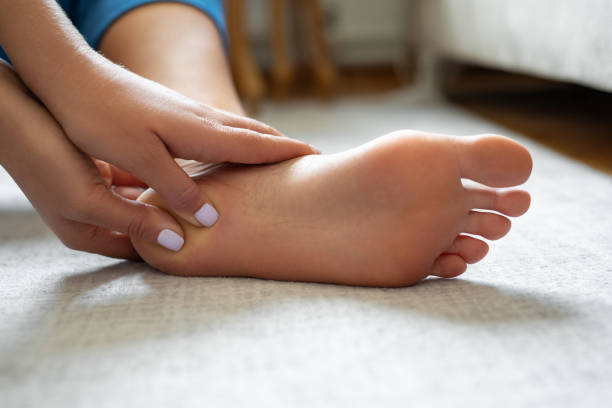Podiatric Tips for Reducing Foot Strain and Improving Overall Health
With the summer approaching, many people will be using their feet a lot more. Here are some tips for keeping them healthy and pain-free.
Propping up the feet for a few minutes daily helps reduce swelling and improves blood flow to the feet. Eating a balanced diet with plenty of nutrients and vitamins is also essential.

1. Stretch Your Feet Regularly
When you spend a lot of time on your feet, it is important to stretch them regularly. This can help alleviate foot pain and prevent it from recurring in the future. There are a few simple exercises that you can do to stretch your feet. To begin, sit in a chair with your feet planted on the ground. Bend your right knee so that the top of your toes is touching the floor. Hold this position for 15 seconds. Then repeat with your left foot.
Another exercise you can do is to stand with your arms at your sides and your hands flat against a wall. Then step back with your left foot, bending your knee slightly. This should create a slight stretch in the calf of your leg and your Achilles tendon. Repeat this exercise 10 to 20 times.
For those who enjoy running, it is essential to take the necessary precautions to prevent foot injuries. By following these tips, runners can stay in the game for as long as possible and avoid any unnecessary discomfort. However, if your foot pain persists, you should contact The Foot Clinic for additional treatment options. They can provide you with the care you need to keep your feet in great shape for years to come!
2. Wear the Right Shoes
When you choose footwear, be sure that it’s supportive and fits well. Shoes that are too narrow or have high heels can put too much stress on your feet, knees, hips and back. You may also have to wear arch supports and orthotics if you have foot problems like flat feet, bunions or hammertoes.
A good shoe should allow you to comfortably wiggle all of your toes when wearing it. It should also provide good shock absorption, which is especially important if you’re an athlete or spend long days on your feet.
The type of shoe you wear can also impact your gait (the way that you walk) and the stresses and strains on your feet, ankles, knees and hips. Shoes that are too small or too narrow can cause foot problems, such as bunions and hammertoes, by pushing against your toes as you walk. Shoes with a low heel that is designed for the sport or activity you’re doing will help to reduce stress on your feet and legs, while still allowing you to be active.

3. Wear the Right Socks
When we’re getting active outside, it’s important to make sure that our feet are comfortable and well supported. This includes a proper shoe fit and socks.
Have you ever gone sockless on a long walk or run only to find your shoes suddenly start rubbing and pinching? If left unchecked, this friction can cause blisters. Wearing the right socks can prevent this by wicking moisture, eliminating chafing, and helping to keep your feet dry.
Additionally, wearing the right socks can help reduce foot odor by keeping them fresh and healthy. The best socks for this are made of natural fibres like wool or bamboo which naturally repel bacteria, and keep your feet fresh and clean.
Another great sock tip is to match the colour of your socks to your shoes. For example, if you’re wearing dark sneakers, it’s a good idea to wear black socks. This way, you’ll create a nice, streamlined look that won’t show any unnecessary colours. If you’re concerned about the amount of bacterial build-up in your shoes, you can invest in a pair of shoe deodorizers that will keep your shoes smelling fresh and odour free for longer. A podiatrist can also advise on orthotics that will redistribute your weight and improve the alignment of your foot, further reducing pain and discomfort. This is especially useful if you have an existing injury or condition such as plantar fasciitis or bunions.
4. Take Care of Your Feet
Taking care of your feet is important to help prevent common problems like calluses, blisters, chaffing, and cracked skin. Proper foot hygiene includes washing your feet regularly with mild soap and warm water, keeping them dry (especially between toes), and moisturizing with a quality foot cream or lotion. Regularly inspecting your feet for abrasions, cuts, or swelling is also important.
If you notice any of these symptoms, seek local podiatry clinic near Floreat immediately to avoid long-term issues and pain. Maintaining a healthy weight and incorporating exercise into your routine can also help prevent many common foot problems.
Always wear shoes that fit correctly, especially when engaging in sports or other activities. Don’t walk barefoot, as this can increase your risk for injuries and infections. If you are diabetic or have poor circulation, consult your podiatric physician for special footwear recommendations and regular check-ups. Avoid self-treating any foot problems as this can often lead to more serious conditions, such as fungus in the toenails or skin of the feet. A fungal infection that isn’t treated can spread to other areas of the body and cause discomfort, itching, and cracking of the skin. To help prevent fungal infections, trim toenails straight across and never cut them too short. Ingrown toenails can also be prevented by gently filing the nails regularly. Soaking your feet in a mixture of hot and cold water can also be beneficial to relax the muscles and relieve pain after a long day on your feet.
